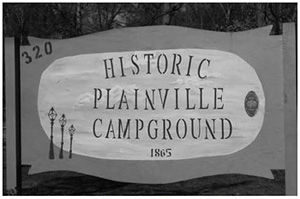The Plainville Camp Grounds was founded in 1865 by the New Haven District of the Methodist Church as “Forestville” on the southern slope of a forested, farmland hill in Plainville, Connecticut known as Campground Hill.
 At the end of the Civil War, the United States was swept by religious fervor sparked by itinerant preachers, Methodist circuit riders, and the rise of the camp meeting.
At the end of the Civil War, the United States was swept by religious fervor sparked by itinerant preachers, Methodist circuit riders, and the rise of the camp meeting.
Camp meetings were a kind of religious revival to which people traveled as far as 40 miles. They brought their bedding, provisions and tents to form outdoor churches that were in constant session for three or four days. People came out of a yearning for religious worship as well as a desire for social contact and festivity.
At Plainville and other camp grounds throughout the country, tents and temporary accommodations gave way around 1900 to permanent Carpenter Gothic, Eastlake and Stick style cottages encircling a tabernacle, dining hall, library and other buildings.
By 1901, a total of 3,000 to 5,000 people were gathering each summer at the Methodist Camp Meetings at Plainville.
As the years passed, full summer programs developed and even more persons attended, sparked by the presence of several other local and nationally significant organizations. These included the American Temperance Movement, the Grand Army of the Republic (forerunner of today’s veterans groups), Seventh Day Adventists, the Forestville Camp and Bible Conference, and the Connecticut Chautauqua.
Chautauqua was founded in western New York State in 1874. It became a summer “Lyceum,” hosting lectures, concerts, entertainment and a summer school for Sunday school teachers. Chautauqua developed a four-year home reading course that, by 1891, enrolled 180,000 people across the nation. The Plainville chapter of Chautauqua brought thousands to its site to hear nationally prominent speakers and entertainers.
In 1957, the Methodist Church sold the property to the newly-formed Plainville Camp Grounds Association, Inc. Since then, the Campgrounds have been restored to a vital seasonal residential community. Most of the original cottages and other buildings are privately owned and have been restored, preserved and maintained. The site is listed on the National Register of Historic Places.
![]() In the 1960’s, one of the cottages was converted into a non-denominational chapel where Sunday afternoon services are held in July and August.
In the 1960’s, one of the cottages was converted into a non-denominational chapel where Sunday afternoon services are held in July and August.
Read more about the Campgrounds in our 150th Anniversary Celebration Brochure – available in Adobe .pdf format.
